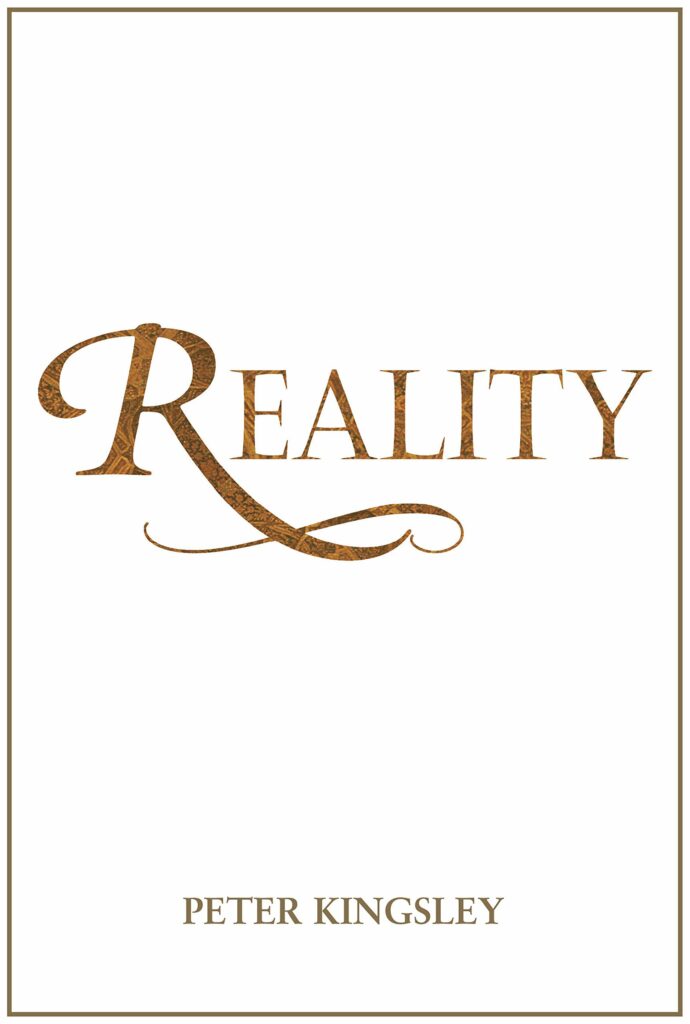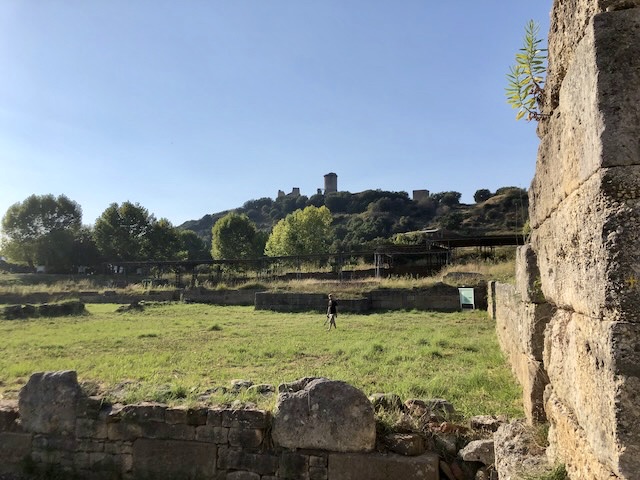Journey with Me Blog Series
Location: Italy, Campania region
My experience there
Elea is the birthplace of Parmenides, one of the most important sage-philosophers of Greek culture, who lived at the end of the 6th century BC. Today, Elea is in Italy, a few hundred kilometers south of Rome. My visit to Elea was part of a road trip. I and my ex-partner and colleague Clara Gomez Santos were visiting ancient temples and powerful spots on the Western coast of Italy, a land full of stratified layers of wisdom and worship.
Besides Clara and myself, the 3rd member of our party was a book, Reality by Peter Kingsley. This book is an essential element of my pilgrimage to Elea, so I need to tell you about it.

Certain books are portals that connect us to characters and events that may be very distant in time, yet proximal in the archetypal landscape. “Reality” is one of these, a book to be meditated on, a guide into the mysteries of the roots of Western civilisation. Specifically, “Reality” tells the story of Parmenides and his role in the development of our collective consciousness.
As we were approaching Elea, Clara and I read passages of Reality to each other, feeling as if we were transported to Parmenides’ times. This amazing period saw Western and Eastern worldviews meet, collide, and cross-pollinate. The tolerant Persian empire of Cyrus the Great extended from Libya and Macedonia to the West, to the very doorstep of India to the East. The mystic currents coming from China and India, through Persia, infiltrated Egypt, where they met with deeply rooted local mysteries. From Egypt, these streams of wisdom penetrated into Turkey and into the Greek world. Pythagoras, the great philosopher-sage from Samos, an Island off the western coast of Turkey, carried those seeds of wisdom all the way to Southern Italy, where he founded his school and community.
Parmenides, born in Southern Italy and a contemporary of Pythagoras, lived and breathed into this lineage of mysticism and wisdom.
For me, having grown up in the cradle of Catholicism, and having sought the depths of spirit in the East for many years, exploring the roots of Western shamanism by visiting the birthplace of Parmenides has meant a complete revolution of perspective. Going back to Parmenides’ time, I witnessed the duality of East and West dissolve into a continuum, and re-discovered Western culture as being a shamanic culture that has its foundation on deeply embodied mysteries.
My pilgrimage to Elea has been an important part of a return to the roots of my own personal and collective lineage, anchored on the shores of the Mediterranean Sea, and a reclamation of the shamanic power of its initiators. Whatever your cultural and spiritual heritage may be, visiting Elea will allow you to connect to a lesser-known, yet extremely powerful, undercurrent of shamanism and spirituality in the lands of Southern Europe.

A little bit of history
Between the 8th and 3rd century BC, a significant part of Southern Italy was effectively an extension of mainland Greece, with some Greek-speaking colonies on Italian soil becoming extremely important cultural and spiritual centers. Visiting Elea, Parmenides’ birthplace, is one of those colonies, just like Crotone, where Pythagoras set up his esoteric school.
According to Kingsley, Parmenides represents one of the last shaman-mystics of Western culture, before philosophy was taken over by Plato and his hyper-rational view of the world. Before we continue, I need to explain what I mean by “shaman.” In my understanding, a shaman is someone who is skilled in navigating different states of consciousness (or “worlds”) and bringing information, wisdom, and healing from those worlds into our ordinary world. Not all philosophers or sages are shamans; what characterizes a shaman is his or her capacity to access altered states of consciousness, be it through dance, fasting, plant medicine, or a variety of other methods.
It is my understanding that, if we go back in time, all cultures across the globe were guided by “shamans.” The possibility to access trans-rational states of consciousness was a defining feature of every civilisation. In the so-called “West,” however, shamanism has largely been forgotten, as society as a whole has progressively embraced the idea that rationality is the one and only “world” worth exploring, and all the other states of consciousness are either childish or dangerous.
And yet, if we follow Kingsley’s reconstruction, we discover that the roots of Western culture lay deep in the darkness of the incubation rites that Parmenides participated in, and in the esoteric doctrines of his mentor Pythagoras. Parmenides was able to access altered states of consciousness through ritual and ceremony. From those states, he would bring back essential information for his community. He did so while being anchored in a very specific lineage: that of the priests of Apollo.
But wait a moment: isn’t Apollo the Greek Sun-god of light and reason, the orderly counterpart to the chaotic and “messy” Dionysus? Not really. Apollo is a much more complex deity; a healer and a guide, yes, but one that operates through the power of the Underworld, administering sacred poison to his disciples. The priests of Apollo, like Parmenides, engaged in ceremonies where they would literally lock themselves in underground caves, to fast, heal, and vision. From those caves, they would emerge with visions and even new laws and norms for their community.
Can you see how the story of Parmenides and Apollo relates to the archetypal tension between Light and Dark? Parmenides and Pythagoras were among the last, at least in Western culture, that boldly advocated the wisdom of healthy Darkness, of being “blind” and putting reason aside, to gravitate nearer to the mystery of Truth.
When you are there
If you choose to visit Elea, I can’t recommend enough that you do so after or while reading Reality by Peter Kinglsey. Reading “Reality” will open a new perspective not only on Parmenides and other important historical figures (Heraclitus, Pythagoras, Zeno, and others) but on the history of the evolution of consciousness. Whether Kingsley’s vision is historically accurate or not, what matters is that through his eyes, we can reimagine our relationship to the origins of so-called “Western culture” and the role it played in our evolution.
With all of that said, please bring your printed copy of Reality with you to Elea, and allow yourself to read a few passages from the book while sitting among the ruins. Through the channel of Kingsley’s world, your own intelligence and connection, and the power of Elea itself, you may connect to one of the most powerful shamanic lineages that the Mediterranean culture has been able to express.

Uau!
Q ganas de leer este libro!